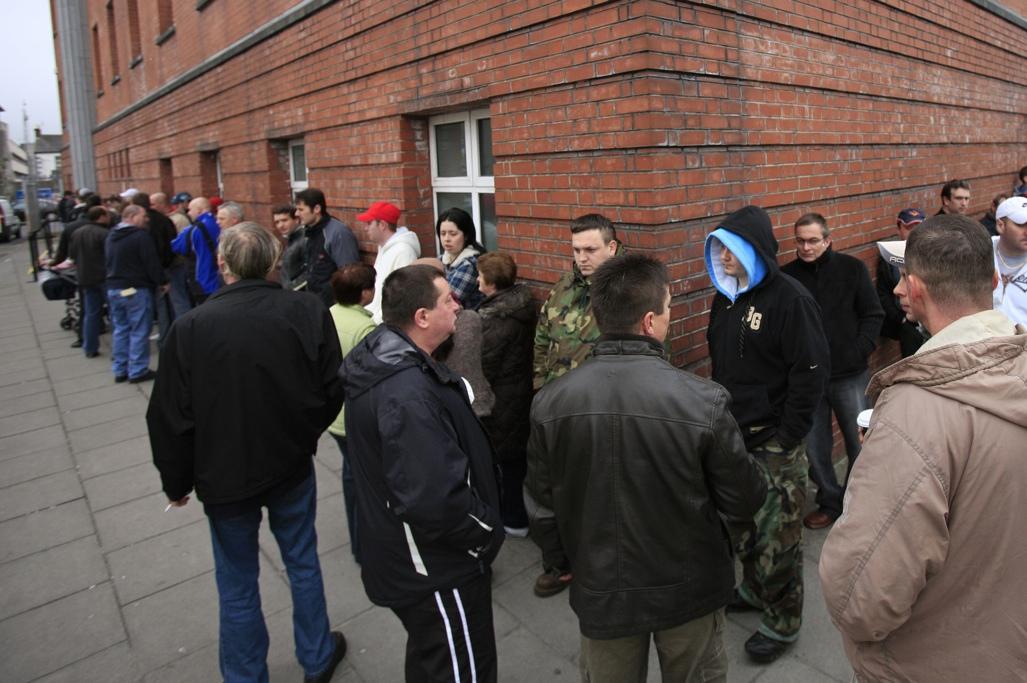Here’s the EU’s new plan to create more jobs
Waiting for work in Ireland.
BRUSSELS, Belgium — With 1-in-10 of the European Union’s workforce languishing on unemployment lines, a plan to create 17 million new jobs might have been expected to receive a warm welcome.
But in a union of 27 nations you can never please everybody, especially when France is in election mode.
“[This] explosive cocktail of ultraliberal measures … reveals the true face of this Brussels-ruled Europe: a machine to crush people and social models,” fulminated far-right presidential candidate Marine Le Pen.
The European Commission’s package of proposals for a “job-rich recovery” is designed to counter criticism that the EU’s austerity-heavy response to three years of debt-crisis is stifling growth and throwing people out of work.
Among the proposals are a call for governments to replace taxes on labor that discourage companies from hiring with increased sales taxes or new levies on pollution. It identifies the green economy, health care and information technology as the main growth areas for jobs and urges increased training to give workers skills in those fields.
Read more: Spain's the next country in the danger zone
“Current levels of unemployment are unacceptable,” said Laszlo Andor, the EU’s employment and social affairs commissioner, who announced the new plan. “If we are to restore growth … the EU needs a dynamic and inclusive European labor market.”
Le Pen was incensed that the EU’s executive body wants nations to open up their labor markets to other EU citizens. She raised the specter of a France invaded by Romanians and Bulgarians — the current preferred bogeymen among rightist circles in Western Europe.
Opening up the European labor market to cross-border jobseekers is a major plank of the plan.
Europeans are increasingly mobile: there are up to 400,000 French estimated to be working in Britain — a figure rarely mentioned by the anti-immigration Le Pen.
However, only 3 percent of working-age EU citizens live in another EU country. Their reluctance to move as freely as their American counterparts for jobs is seen as a major handicap to the European economy.
The problem is particularly acute now with record levels of unemployment in countries like Greece, Spain and Portugal while there are an estimated 4 million jobs open in the EU — especially in Germany and other northern nations.
Read more: Should the EU give up on green energy?
In its package, the commission calls for new rules making it easier for cross-border job seekers to keep pension rights, avoid taxation hurdles and export their unemployment benefits while looking for work abroad. The plan also calls for the expansion of a pan-European online jobs-search portal, EURES.
There should be greater recognition of qualifications, and closed-shop professions — from taxi-driving in Italy to guiding tourists in Slovakia — should be pried open, Andor said.
“There are a variety of professions that are protected on various grounds and many of them should be reconsidered in the 21st Century,” he told a news conference at the European Parliament in Strasbourg, France. “If we have a single market for goods and services, we need a truly European labor market as well.”
That’s hot stuff in many European countries.
Those Italian taxi drivers have been angrily protesting against attempts by the government in Rome to open up their protected jobs. In France, such talk revives the angry debate about foreign professionals — symbolized by Polish plumbers — that sparked anti-EU sentiment in the mid-2000s.
Read more: Euro-trashing in France. What? It's an election year
Le Pen found common ground with far-left candidates in Sunday’s French presidential election to accuse the commission of seeking to undermine France’s cherished statutory monthly minimum wage — which currently stands at 1,398 euros ($1,834), compared to 748 euros ($982) in Spain, 138 euros ($181) in Bulgaria or none at all in Germany, Italy and Sweden.
The EU head office strongly denied French reports it was seeking to impose an EU-wide minimum, saying that was up to individual governments.
However, the plan does say minimum wages should be adjusted up or down more frequently to take account of economic conditions and suggests that the wage could vary depending on the job — anathema to the left in France.
Socialist candidate Francois Hollande can take comfort from Andor’s call for closer EU monitoring of nations’ job-creation efforts and a scoreboard to name-and-shame those not doing enough. Hollande has advocated re-negotiating the recent EU treaty that commits nations to tight budgets, to include similar targets for growth and employment.
Leaders of the 27 EU nations are scheduled to discuss the plans at a summit in June, by which time Hollande could be president.
Read more: What the French elections mean for the euro zone
Mainstream center-left and center-right politicians in the European Parliament gave a cautious welcome to many of the proposals, which aim to create the 17 million jobs by 2020.
There is fear, however, that such long-term plans do little for countries in urgent need of help to survive the debt crisis.
“Instead of expressing complacency with a reality that does not exist, we need a new approach,” warned former Belgian Prime Minister Guy Verhofstadt, who heads the liberal faction in the European Parliament. He demanded a “real global growth strategy” to pump public money into the economy of recession-hit countries and a European Redemption Fund of 2.3 trillion euros ($3 trillion) to share national debt burdens across the EU.
Every day, reporters and producers at The World are hard at work bringing you human-centered news from across the globe. But we can’t do it without you. We need your support to ensure we can continue this work for another year.
Make a gift today, and you’ll help us unlock a matching gift of $67,000!
